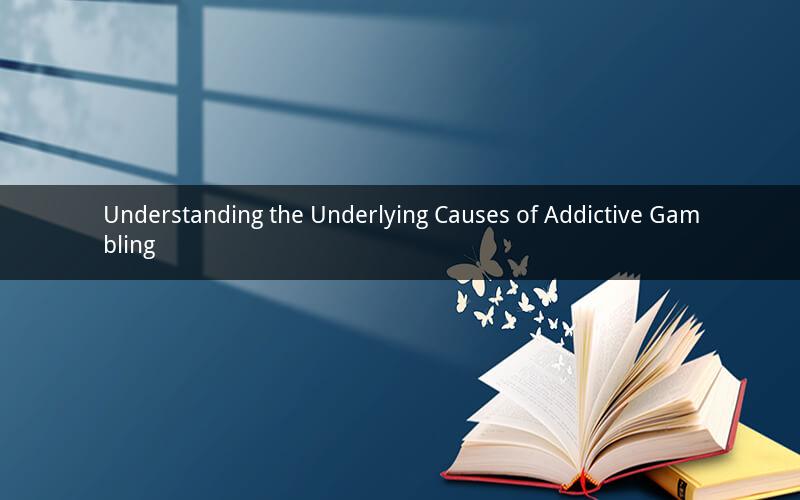
Introduction:
Addictive gambling is a complex issue that affects millions of people worldwide. It is crucial to comprehend the various factors that contribute to the development of gambling addiction to effectively address this problem. This article delves into the potential causes of addictive gambling, exploring psychological, environmental, and biological aspects that play a role in this detrimental behavior.
1. Psychological Factors:
a. Dopamine Imbalance:
The release of dopamine, a neurotransmitter associated with pleasure and reward, is believed to be a significant psychological factor in addictive gambling. The thrill of winning and the anticipation of future wins can trigger the release of dopamine, creating a sense of euphoria and reinforcing the gambling behavior.
b. Impulse Control Disorders:
Individuals with impulse control disorders, such as ADHD (Attention-Deficit/Hyperactivity Disorder), may be more susceptible to developing gambling addiction. These disorders affect the ability to resist impulses, making it easier for individuals to engage in addictive behaviors, including gambling.
c. Mental Health Disorders:
Conditions like depression, anxiety, and bipolar disorder can increase the risk of developing addictive gambling. These disorders may lead individuals to seek relief through gambling, as it provides a temporary escape from their emotional turmoil.
2. Environmental Factors:
a. Accessibility to Gambling:
The availability and accessibility of gambling opportunities play a crucial role in the development of addictive gambling. Increased exposure to casinos, online gambling platforms, and gambling advertisements can contribute to the normalization and encouragement of gambling behavior.
b. Peer Influence:
The influence of friends or family members who engage in gambling can significantly impact an individual's susceptibility to addiction. Being surrounded by individuals who encourage or participate in gambling activities can make it more appealing and difficult to resist.
c. Media Portrayal:
The portrayal of gambling as an exciting and glamorous activity in movies, TV shows, and advertisements can create unrealistic expectations and perpetuate the idea that gambling is a harmless form of entertainment.
3. Biological Factors:
a. Genetic Predisposition:
Research suggests that there may be a genetic component to addictive gambling. Individuals with a family history of gambling addiction may have a higher risk of developing the disorder themselves.
b. Brain Chemistry:
Neuroimaging studies have indicated that individuals with gambling addiction may have altered brain chemistry, particularly in regions associated with decision-making, reward, and impulse control.
4. Personal Factors:
a. Age:
Younger individuals may be more vulnerable to developing addictive gambling due to their developing brains and lower levels of impulse control.
b. Financial Situation:
Financial difficulties can increase the likelihood of engaging in gambling as a means to escape debt or financial stress.
5. Societal Factors:
a. Cultural Attitudes:
Societal attitudes towards gambling can influence an individual's likelihood of developing an addiction. In cultures where gambling is widely accepted and normalized, the risk of addiction may be higher.
b. Economic Factors:
Economic downturns and high unemployment rates can lead individuals to turn to gambling as a way to alleviate financial strain, increasing the risk of addiction.
Conclusion:
Addictive gambling is a multifaceted issue influenced by psychological, environmental, biological, and personal factors. Understanding these underlying causes is crucial in developing effective strategies to prevent and treat gambling addiction. By addressing these factors, individuals can overcome their addiction and lead healthier, more fulfilling lives.
Questions and Answers:
1. How does dopamine imbalance contribute to addictive gambling?
Dopamine imbalance, specifically the excessive release of dopamine, plays a role in addictive gambling by creating a sense of euphoria and reinforcing the gambling behavior. This reward-driven mechanism can make individuals more likely to engage in gambling repeatedly.
2. Can depression and anxiety contribute to addictive gambling?
Yes, mental health disorders such as depression and anxiety can contribute to addictive gambling. These disorders may lead individuals to seek relief through gambling as a means to escape their emotional turmoil.
3. What are the potential biological factors associated with addictive gambling?
The potential biological factors include genetic predisposition and altered brain chemistry, particularly in regions associated with decision-making, reward, and impulse control.
4. How can accessibility to gambling opportunities influence addictive gambling?
Increased accessibility to gambling opportunities, such as casinos and online platforms, can contribute to addictive gambling by creating a higher exposure to gambling activities and reinforcing the behavior.
5. Can cultural attitudes towards gambling impact the risk of developing an addiction?
Yes, cultural attitudes towards gambling can impact the risk of developing an addiction. In cultures where gambling is widely accepted and normalized, the risk of addiction may be higher due to the normalization and encouragement of gambling behavior.